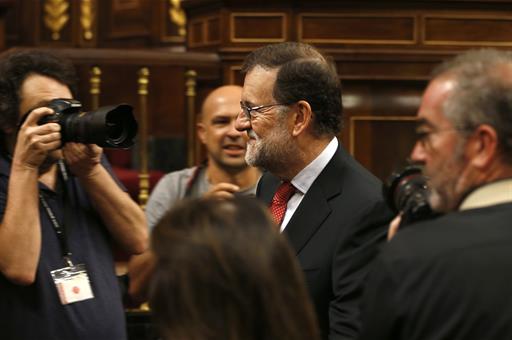Mariano Rajoy expects new Law on the Self-Employed to enter into force "this year"
President's News - 2017.7.12
Lower House of Parliament, Madrid
In response to a question from the spokesperson for Ciudadanos [Citizens], Albert Rivera, about the entry into force of the new Law on the Self-Employed, Mariano Rajoy explained that it could happen "this year", although it still needs to pass through the Upper House of Parliament, which he hopes can be done "as quickly as possible".
The President of the Government, Mariano Rajoy, also added that the new Law on the Self-Employed will allow the self-employed to choose "active retirement"; i.e. they will be able to collect 100% of their pension while continuing to work. To do so, they must have at least one employee. In this regard, the President of the Government recalled that, at present and under the Royal Decree-Law approved by the Government of Spain in 2013, the self-employed can receive 50% of their pension "while still working provided they meet certain requirements".
The new Law on the Self-Employed, a good step
The requirement to have an employee that must be met by a self-employed individual in order to be entitled to 100% of their pension and keep working is a requirement that already exists in law, said Mariano Rajoy. However, he explained that laws "can be changed". The President of the Government believes that the new Law on the Self-Employed is "a good step", although "more steps will have to be taken in the future".
 Pool Moncloa/Diego CrespoFurthermore, Mariano Rajoy underlined the importance of self-employed workers "in our productive fabric" and "the fundamental role" they have played in "the recovery of the Spanish economy". As he explained, we are talking about four million people: over 3,200,000 work for themselves and they employ a further 872,000 workers. For this reason, the Government of Spain has "tried to take decisions that could help" this group, such as the Supplier Payment Plan, the flat-rate 50-euro tariff and various tax breaks.
Pool Moncloa/Diego CrespoFurthermore, Mariano Rajoy underlined the importance of self-employed workers "in our productive fabric" and "the fundamental role" they have played in "the recovery of the Spanish economy". As he explained, we are talking about four million people: over 3,200,000 work for themselves and they employ a further 872,000 workers. For this reason, the Government of Spain has "tried to take decisions that could help" this group, such as the Supplier Payment Plan, the flat-rate 50-euro tariff and various tax breaks.
Condemnation of two ministers
Margarita Robles, spokesperson for PSOE [Spanish Socialist Workers' Party], asked which measures the President of the Government will adopt regarding the condemnation of two ministers by the Lower House of Parliament. In this regard, the President of the Government, Mariano Rajoy, clarified that such decisions by the Lower House do not require him to adopt any measures "and that is what I will do".
The President of the Government recalled that, according to Article 100 of the Spanish Constitution, "the President of the Government is exclusively responsible for appointing and removing ministers", meaning that any voting in the Lower House of Parliament in this case has the "political value" that "each of us wishes to give it". At any event, he called for "balance, common sense and restraint" from his political colleagues.
Corruption
In response to the spokesperson for Unidos Podemos [United We Can], Pablo Iglesias, who asked about the economic cost of corruption, Mariano Rajoy said that "what matters is fighting it to eradicate it" because "corruption is always negative".
After reiterating his commitment to this fight, the President of the Government explained that actions should be focused on three things: increasing controls to reduce discretion in administrative decisions; improving the resources given to those who combat corruption; and raising penalties. "The Government of Spain has been working along these lines, continues to do so and will continue doing so in the future", he said.
Mariano Rajoy also highlighted the positive results being achieved, given that many cases from the past are now coming to light. "The State works and so we should persevere", he said.
Tribute to Miguel Ángel Blanco
 Pool Moncloa/Diego CrespoAt the start of the session, the Lower House of Parliament held a minute's silence in tribute to Miguel Ángel Blanco, the PP councillor in Ermua who was killed by the terrorist group ETA 20 years ago.
Pool Moncloa/Diego CrespoAt the start of the session, the Lower House of Parliament held a minute's silence in tribute to Miguel Ángel Blanco, the PP councillor in Ermua who was killed by the terrorist group ETA 20 years ago.
Later on, in the corridors, the President of the Government said that the kidnapping and subsequent murder of the young Basque politician was "a before and after" in the fight against terrorism. He said that society "reacted very well" and Miguel Ángel became "a symbol of defence of life, liberty and people's rights".
Catalonia
When asked by the media about the sovereignty process in Catalonia, Mariano Rajoy called for calm. He stressed that the Government of Spain "is very calm" and that he "will not contribute to raising the tone of statements, which is what some people are doing". He added that the Government of Spain "knows perfectly well what it has to do" and that, "under no circumstances", will it authorise or allow a referendum to be held that "clearly goes against the law".





